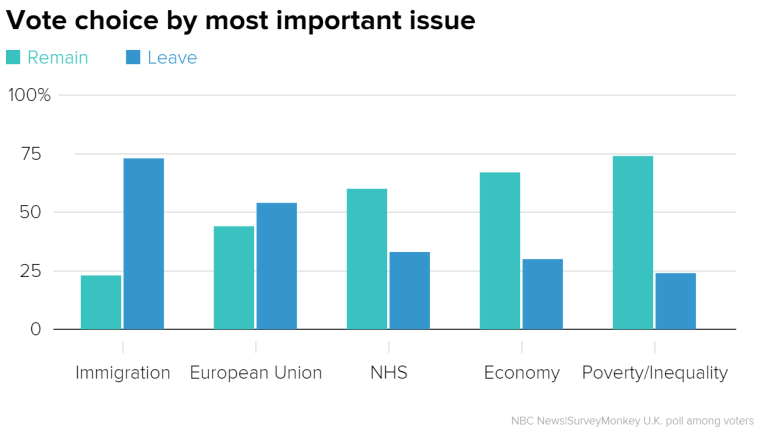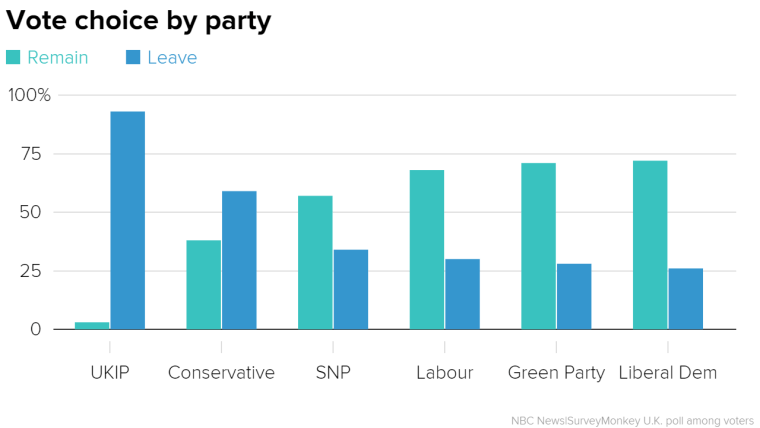British voters are deeply and evenly divided about whether to quit the European Union in next week’s historic vote, according to a NBC News/SurveyMonkey U.K. poll.
The new poll has the historic vote as a toss-up: 48 percent of Britons say they’ll cast a vote to “Leave” the EU in the referendum known as “Brexit,” and an identical 48 percent prefer to “Remain.” A mere 4 percent are undecided just a week before the June 23 vote.

The even split stands in stark contrast to what British voters — and betting markets — expect from the vote: By a whopping 60 to 37 percent margin, far more voters in the new poll anticipate the Remain side will prevail over Leave.
The poll was conducted before the killing of pro-Remain lawmaker Jo Cox on Thursday — an attack that forced the suspension of campaigning around the referendum and which analysts say could hurt the momentum of the “Leave” campaign.
Cox had recently defended immigrants and expressed concern that xenophobia had overtaken the Brexit campaign, writing in a commentary for her local Yorkshire Post newspaper last week that “immigration is a legitimate concern, but it’s not a good reason to leave the EU.”
A major driver of voter support of a break-up stems from the prominence of immigration issues in the U.K. today. Nearly a third of all Britons who plan to cast ballots in the Brexit single out immigration as the No. 1 issue in the country today. Fully 73 percent of immigration issue voters back Leave, and just 23 percent prefer Remain.

The Leave side also prevails among those who see EU membership itself as the country’s top concern (54 percent Leave versus 44 percent Remain). Together, well over 4 in 10 voters see immigration (31 percent) and the EU itself (13 percent) as the top issues.
Voters who prioritize each of the three other top five issues — the economy, the National Health Service and poverty/inequality — all side with Remain by big margins. So the best shot for advocates of continuing British membership in the EU may be to expand the number of issues on voters’ minds beyond the narrow membership question and the broader immigration issue. This is a difficult task to accomplish with less than a week until the vote.
Related: Why America Cares About the Brexit Vote
British Prime Minister David Cameron has been a fierce advocate of rejecting Brexit, but his low approval numbers limit his value in the waning days of the campaign. Just 29 percent of those apt to vote in the referendum are satisfied with the way he’s handling his job; 69 percent are dissatisfied.
Of course, Cameron was also well underwater with voters last year but managed to lead his Conservative Party to a historic win in the May 2015 parliamentary elections. But then, as opposed to now, the economy was the No. 1 issue, and far more voters saw the economy on the upswing than on a downward trajectory, according to a pre-election survey by SurveyMonkey that predicted the 6-point Tory win.
In the new poll, 49 percent say the nation’s economy has deteriorated over the past 12 months; just 21 percent say it has improved (28 percent say it’s stayed about the same).
Cameron is also now running in opposition to the views of a majority of Conservative voters, who side with leave by a 21-point margin (38 percent Remain to 59 percent Leave). By contrast, more than two-thirds in the Labour Party back Remain (68 to 30 percent for Leave).

But there are also headwinds hampering Leave and its backers’ efforts to upset the status quo in place since Britain first joined the EU in 1973. By better than 2-to-1, more British voters see British businesses as having been “helped” rather than “hurt” by the country’s membership in the EU. And there’s nearly as strong a ratio when it comes to the EU’s impact on British consumers. Still, the Leave side has pushed hard to highlight that the EU has disproportionately benefited upper-class Britons.
Related: Tech Leaders Want Single EU Market, Not 'Terrible' Brexit
In fact, there’s a widespread sense that it’s the country’s wealthy that have benefited most clearly from EU membership. A 51 percent majority of voters say upper-class individuals have benefited from Britain’s being part of the EU; fewer, under 4 in 10, see evident benefits for people in the middle and working classes.
Higher-educated Britons are also more apt than those with less formal education to see the EU as benefiting people in the middle and working classes.
This NBC News|SurveyMonkey U.K. poll was conducted online June 8 to 15 among a national sample of 3,533 British voters who say there’s a chance they’ll vote in the Brexit referendum. Results have an error estimate of +/- 2 percentage points. For full results and methodology, please click here.
Jon Cohen is the chief research officer of SurveyMonkey and John Lapinski is director of elections for NBC News.
